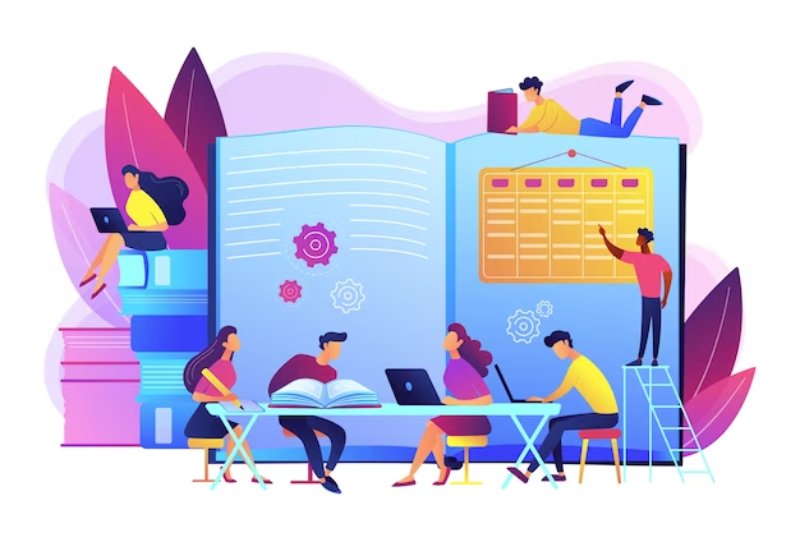Library Lesson Plans for Evaluating and Using Information are designed to empower students with critical thinking skills and information literacy, enabling them to navigate the vast sea of information available in today’s digital age. These lesson plans focus on teaching students how to evaluate the credibility, relevance, and accuracy of various sources, including websites, articles, and books. Students will learn how to identify biased information, distinguish between fact and opinion, and recognize potential misinformation or fake news. Additionally, the lesson plans provide guidance on effective note-taking, citation practices, and ethical use of information. By engaging in interactive activities, group discussions, and hands-on exercises, students will develop a strong foundation for evaluating and utilizing information effectively. These lessons foster critical thinking, promote responsible research practices, and equip students with essential skills to succeed in academia and beyond.
Mastering Information Evaluation: Library Lesson Plans
Information Evaluation Is A Critical Skill For Students In The Digital Age. This Library Lesson plans focus on helping participants master the art of evaluating information sources effectively. The lessons will cover techniques for assessing the credibility, reliability, and bias of different types of sources, including websites, articles, and online databases. Students will learn how to critically analyze information for accuracy and relevance to their research needs. The lesson plans will also incorporate hands-on activities and group discussions to engage students in practicing their information evaluation skills. By the end of these lessons, participants will have the tools and knowledge to evaluate information sources confidently, ensuring they use reliable and trustworthy materials in their academic work.

Unlocking The Power Of Information: Library Lesson Strategies
In the digital age, students have access to vast amounts of information, but they must also navigate its complexity and discern its value. These library lesson strategies focus on equipping participants with the skills and strategies to unlock the power of information effectively. The lesson plans will introduce students to advanced search techniques, such as Boolean operators, truncation, and field searching, to refine their search results and access relevant information efficiently. Participants will also explore strategies for organizing and managing information using note-taking techniques and digital tools. Additionally, the lessons will emphasize the importance of information literacy and ethical use of information. By implementing these strategies, students will be able to harness the power of information for their academic success and lifelong learning.
Teaching Critical Thinking Through Library Lesson Plans
Critical thinking is an essential skill for evaluating and using information effectively. These library lesson plans aim to teach critical thinking through engaging activities and discussions. Students will learn how to approach information critically by examining multiple perspectives, questioning assumptions, and detecting logical fallacies. The lesson plans will incorporate case studies, real-world examples, and interactive exercises to promote critical thinking skills. Participants will also explore the role of bias in information and develop strategies for recognizing and addressing bias in their research. The lessons will encourage students to think critically about the credibility, relevance, and authority of information sources. By the end of these lessons, students will have honed their critical thinking abilities and be better equipped to evaluate and use information in an informed and discerning manner.
Navigating The World Of Information: Library Lesson Insights
In An Era Of Abundant Information, The Ability To Navigate And Make Sense Of It Is Crucial. These library lesson insights provide participants with valuable strategies and tools to navigate the world of information effectively. Students will explore various information sources, including databases, digital libraries, and online platforms. They will learn how to conduct efficient searches, evaluate the credibility of sources, and critically analyze information for relevance and reliability. The lessons will also emphasize the importance of information ethics and responsible use of sources. By implementing these insights, students will become savvy information navigators, equipped with the skills to find, evaluate, and utilize information resources in their academic pursuits.
Effective Information Utilization: Library Lesson Blueprints
To make the most of the information available, students need to develop effective utilization skills. These library lesson blueprints provide step-by-step plans for teaching participants how to utilize information efficiently and ethically. The blueprints will cover strategies for organizing and managing information, including note-taking techniques, citation practices, and digital tools for information management. Students will learn how to synthesize information from multiple sources and incorporate it into their research effectively. The blueprints will also include activities that promote critical thinking and analysis of information. By following these blueprints, students will enhance their information utilization skills, enabling them to leverage information effectively in their academic work.
Enhancing Research Skills: Library Lesson Plans Demystified
Research skills are fundamental for academic success. These library lesson plans demystify the research process, providing participants with comprehensive guidance on developing and enhancing their research skills. The lesson plans will cover topics such as formulating research questions, conducting literature reviews, selecting appropriate research methods, and evaluating research findings. Students will learn how to navigate research databases, access primary and secondary sources, and utilize advanced search strategies. The lesson plans will also incorporate activities that foster critical thinking, problem-solving, and effective communication of research findings. By implementing these plans, students will gain confidence in their research abilities, allowing them to undertake rigorous and impactful research projects.
Conclusion
In conclusion, these library lesson insights, blueprints, and plans are invaluable resources for empowering students in the realm of information literacy. Navigating the world of information requires skills in searching, evaluating, and critically analyzing sources. Effective information utilization involves organizing and synthesizing information ethically and efficiently. Enhancing research skills is essential for conducting rigorous and impactful research. By implementing these lessons, students will acquire the knowledge and skills necessary to navigate the vast information landscape, harness the power of information effectively, and enhance their research capabilities. Ultimately, these library lessons will equip students with the tools they need to succeed academically and thrive in an information-driven world.